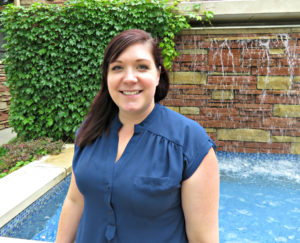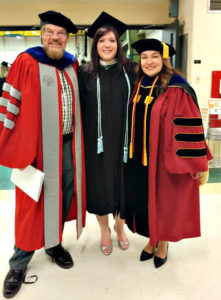Story by Melissa Pickett

Emily Rice took a winding road to earning her teaching degree. “People had suggested to me that I should consider being a teacher,” she said. “I wanted to try to do something else with my degrees, but the idea of teaching was always in the back of my mind.”
Rice graduated on May 12, with a master’s degree in English education and a teacher licensure concentration. She has been a School of Education student employee since 2014.
Background
Rice earned her B.F.A. in creative and professional writing, with a minor in art history, from Bemidji State University in Minnesota. Originally, she had plans to pursue a Ph.D. in art history or curating so she could work at an art museum.
After some time spent working in professional office environments, Rice decided to research teacher preparation programs. She discovered an appreciation for the way teacher licensure works in Colorado: Students earn a degree in a specific content area while pursuing a concentration in licensure to gain teaching preparation and experience.
“In Minnesota, teachers earn an undergraduate degree in teaching, which means they take a lot of courses in all content areas—regardless of what they want to teach,” she explained. “I wasn’t really interested in taking classes in math or sciences, because I knew I wanted to teach English. Plus, already having a bachelor’s degree, I wanted to pursue a master’s degree and really dig into one content area. I like that Colorado’s licensure process means a focus on being strong in the content area you want to teach, and gaining the pedagogical foundation through the teacher preparation program.”
Experience in licensure and master’s programs

Rice credits the faculty members in both the Department of English and the School of Education’s Center for Educator Preparation for helping her build a strong teaching foundation. CEP’s Professional Development Model, somewhat unique to teacher preparation programs in the state and beyond, puts licensure candidates in front of students from the first day of the program—something Rice said was critical to helping her develop the confidence to tackle her own classroom.
“From day one, you learn the theory and you learn by doing. The teachers mentoring you in the secondary school classrooms are always teaching you something, whether you’re in the room for an hour a couple times a week or actually teaching the class daily.”
As an English education student, Rice found the master’s degree both challenging and fulfilling, and she appreciated how closely the faculty in both programs collaborated.
“In my English Education Methods course, we used the CEP lesson plan template from the beginning, whereas students in other content areas might not use them until a CEP course,” said Rice. “By the time we got to those courses, we were comfortable with the template.”
Rice said she enjoyed a course on adolescent literature so much, she worked as a teaching assistant during a subsequent semester.
“We read the books students read in a language arts course,” she explained. “While we read some classics, we also read current books trending with middle and high school students today. We learned why kids gravitate to books, and how trends impact student reading preferences.”
Reading currently trending books paid off during her time as a student teacher, said Rice.
“I was able to connect with high school kids, and have discussions on the books I read during my Adolescent Lit classes.”
Experience as a student employee
Rice didn’t expect to find employment with the School of Education when she started her graduate program. She credits a lost phone and conversation with leading her to employment.
“I accidentally left my phone in a classroom in the Education Building,” she laughed. “When I went to the main office to see if someone had turned it in, I ended up chatting with the person in the office about my background. Once she learned I had professional office experience, and a writing background, the rest was history.”
Working as a student administrative assistant alongside faculty who taught her education courses was great, said Rice. She was frequently recruited to be an event photographer, which provided learning opportunities while photographing educators during professional development workshops. Building relationships with faculty and staff and being immersed in an education environment are invaluable experiences, she said.
“The faculty and staff know I’m a student first, and have supported me through flexibility and advice. They’ve become a community to me.”
Future goals in education
Currently looking for a teaching job, Rice has a lot of options. She’s considering a return to Minnesota, where her family and friends are anxiously hoping she lands; however, she says she’d love to experience a new location, including overseas.
“I’m focusing on finding a good fit,” she said. “Teaching is very personal. You need to find a place that is a good fit for you, or you won’t feel able to build a sense of community.”
Rice is also interested in pursuing a doctoral degree, possibly in cognitive or behavioral psychology, an interest sparked by her master’s thesis research focused on how ADHD affects a student’s college and career readiness and growth mindset.
“I’m really interested in curriculum development that integrates cognitive and behavioral psychology with classroom learning, especially for adolescents. Kids are very intelligent, but those with ADHD diagnoses might struggle with college and career readiness. I want to change that.”
As her time as a student employee comes to a close, Rice said the most important thing she has learned is to keep moving forward.
“A teacher is always learning—you can never get bored, because there is always something new to learn. You always have new students and new experiences. I’m lucky, because I know I can reach out to the School of Education faculty for professional advice and guidance, without hesitation.”
The School of Education is part of CSU’s College of Health and Human Sciences.